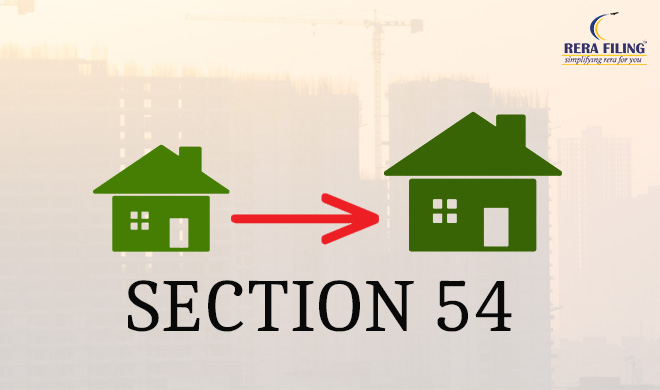How to save Capital gains tax?

- Friday 26th April 2019
- Author: Shreya Uppal
Highlights
If the new house is sold before a period of 3 years from the date of its purchase/ completion of construction, then at the time of computation of capital gains arising on transfer of the new house, the amount of capital gain exempted will be deducted from the cost of acquisition of the new house.
Section 54 gives relief from such a hardship. It gives relief to a taxpayer who sells his residential house and from the sale proceeds, he acquires another residential house.
The basic intention behind introducing this section was to remove the hardship of a common man. A person wanted to shift his residence due to various reasons like a job transfer, retirement, etc, so in this case, the objective of the seller was not to earn income by the sale of an old house but to acquire another suitable house. Therefore, Section 54 gives relief from such a hardship. It gives relief to a taxpayer who sells his residential house and from the sale proceeds, he acquires another residential house.
A. Detailed provision:
1. Section 54 exemption is available to Individual and HUF (Hindu Undivided Family).
2. The asset transferred should be a Long Term Capital Asset, being a residential house property. Generally, as per section 2(42A) of the Income Tax Act, 1961, Long term capital asset means a capital asset held by an assessee for more than 36 months immediately preceding the date of its transfer, but with effect from Assessment Year 18-19, the period of holding in case of immovable property is reduced from 36 months to 24 months, otherwise it will be categorized as short term capital asset.
3. The amount should be invested to purchase the new house property within a period of one year before or two years after the date of transfer of old house property, or the taxpayer should construct a residential house within a period of three years from the date of transfer of old house property.
4. If till the date of filing the return of income, the capital gain on the transferred house has not been utilized to purchase or construct the house, then the benefit of exemption can be availed only by depositing such amount in Capital Gains Account Scheme (CGAS) in any branch of public sector bank.
5. The new house can be purchased/ constructed by withdrawing the said amount within the limit of 2 yrs/ 3 yrs as the case may be.
6. This Capital gain amount has to be deposited in CGAS till the date of filing of return of income, any delay in depositing the said amount will lead to cancellation of availability of an exemption under this section.
7. The Budget of 2019 has come up with a new point to extend the benefit of exemption in respect of investment made in two residential house properties.
The exemption shall be available in case of investment made by way of purchase or construct, in two residential house properties only if the long term capital gain does not exceed Rs. 2 crores. This option is available for once in a lifetime, therefore if exercised once, cannot be used again in any other assessment year.
B. Amount of Exemption:
It shall be lower of the following:
1. Amount of capital gains arising on transfer of the residential house.
2. Amount invested in purchase/ construction of new residential house property (including the amount deposited in CGAS)
C. Consequences if the new house is transferred
To keep a check on misutilisation of this benefit, a restriction is inserted in section 54. The restriction is in the form of prohibition of the sale of the new house.
1. The restriction will be attracted if after claiming an exemption under this section, the new house is sold before a period of 3 years from the date of its purchase/ completion of construction.
2. If the new house is sold before a period of 3 years from the date of its purchase/ completion of construction, then at the time of computation of capital gains arising on transfer of the new house, the amount of capital gain exempted will be deducted from the cost of acquisition of the new house.
D. Examples to clear the provisions:
1. Mr. X purchased a residential house in April 2014 and sold the same in April 2019 for Rs. 10 Lakhs. Capital gain arising on the sale of the house amounts to Rs. 1 lakh. Can he claim to benefit u/s 54 by purchasing/constructing another residential house?
Ans: Yes, he can claim as all conditions of section 54 has been satisfied regarding LTCA (Long term capital asset, time period of investment and he is an individual too)
2. Mr. X purchased a house in April 2015 and sold the same in April 2019 for Rs. 50 Lakhs. Capital gain amounted to Rs. 5 Lakhs. Can he claim the benefit of section 54 by investing that capital gain in Gold?
Ans: No, he cannot claim to benefit u/s 54, as it is meant for purchasing the new asset as a residential house only, not for Gold.
3. Mr.Y purchased a residential house in the previous year 2005-06 for Rs. 2 crores. The house property is sold for Rs. 10 crores in the previous year 2019-20 and the capital gain is invested in two residential house properties worth Rs. 4 crores each. Can he claim the benefit of section 54 in respect of both houses?
Ans: No, he cannot claim the benefit u/s 54 in respect of both the houses as capital gain is more than 2 crores(10-2=8 crores) and as per budget 2019, to claim the benefit of 2 houses maximum capital gain allowed is Rs. 2 crores.
4. Mr. Z sold his house in April 2018 for Rs. 25,20,000. LTCG arising on t/f of old house amounted to Rs. 8.4 lakhs. In December 2018 he purchased another residential house worth Rs. 5 lakhs. The new house was sold in April 2019 for Rs.12 lakhs(stamp duty value was Rs. 10 lakhs). What will be the number of taxable capital gains in F/Y 18-19 and 19-20 in the hands of Mr. Z?
Ans: For F/Y 18-19
LTCG on t/f of old house= 8.4 lakhs
(-) Exemption u/s 54= 5 lakhs
Taxable amount= Rs. 3.4 lakhs
Since, Mr.Z has sold the new house within a period of 3 years, hence, the exemption granted shall be withdrawn.
For F/Y 19-20
Sales Consideration= 12 lakhs
(-) Cost of Acquisition(5 lakhs-5 lakhs(exemption withdrawn))= Nil
Taxable amount= Rs. 12 lakhs
More Articles
- Online Listing Tips for Real Estate Agents
- How to start a Real Estate business in India - a complete guide !
- Renting Vs Buying property - How will you decide?
- What you should do in Property Management services
- Home Loan Insurance
- How to choose your builder?
- How to ensure fire safety in your home!
- Tips To Keep In Mind While Taking A Home On Rent
- Importance of Home Security
- How to plan your property budget?
- Leased vs. Purchased vs. Co-Working Office Spaces
- Easy Tips to Build an Eco Friendly Home
- Sample Flat - A Trick by a Builder?
- How to have a Beautiful Guest Room? Impress your Guests with these Guest Room Ideas..
- Understanding MCLR and its Effects on Home Loans
- 5 simple ways to close a real estate deal
- Is it worth to buy property near an airport ?
- Home loan tax benefit
- How to be successful in business as an introvert
- Cost effective home decor ideas
- What to Be-Paying Guest or a Tenant??
- Complete guide to start your small business
- Sports township- New trend in India
- Online Listing Tips for Real Estate Agents
- Understanding Floor Area Ratio- FAR
- Town and Country Planning | Meaning and Importance
- Checklist of Important Property Documents- All You Need to Know
- Role of CREDAI in real estate
Copyright © 2024 RERA Filing. All rights reserved.
 Rera
Act
Rera
Act
 Maharashtra
Maharashtra Karnataka
Karnataka Telangana
Telangana Andhra Pradesh
Andhra Pradesh Delhi
Delhi Uttar Pradesh
Uttar Pradesh Haryana
Haryana Gujarat
Gujarat Bihar
Bihar